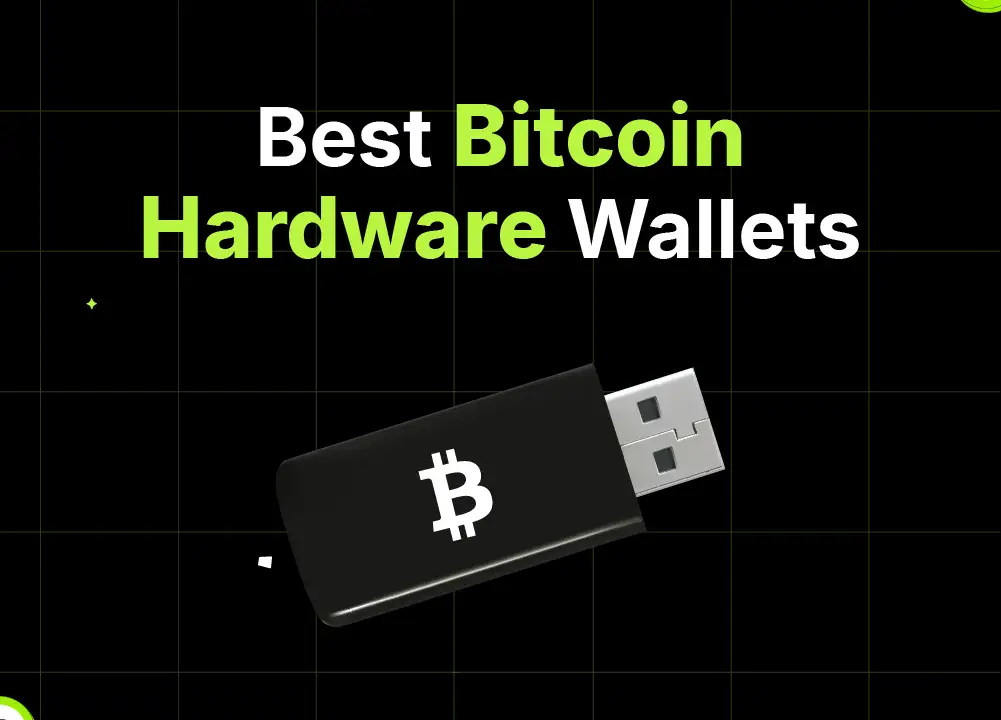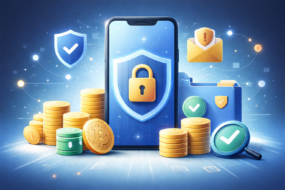
Securing your digital assets becomes all the more important when it comes to crypto trading. Bitcoin, the most valued cryptocurrency, requires particular attention when it comes to security. Hardware wallets continue to be the gold standard for secure Bitcoin storage in 2024 and going forward. Unlike software wallets that reside on your computer or mobile device and are susceptible to hacking, hardware wallets provide an offline means of storage, greatly enhancing security.

In this article, we’ll speak about some of the best Bitcoin hardware wallets available in 2024, examining their features, usability, and security measures.
1. Ledger Nano X
The Ledger Nano X remains a front-runner in the world of Bitcoin hardware wallets. Launched by Ledger, a leader in cryptocurrency security, this device offers an ideal combination of accessibility and security.
Features
The Ledger Nano X supports over 1,800 cryptocurrencies, including Bitcoin. It stands out with its Bluetooth connectivity feature, which allows users to manage their cryptocurrencies easily from their mobile devices while keeping their private keys offline and secure.
Usability
One of the standout features of the Nano X is its large screen, which simplifies device interaction and verifies transactions easily. The device is compatible with the Ledger Live software, which facilitates easy management of your assets. You can view your accounts, send and receive cryptocurrencies, and even install new applications on the device without compromising security.
Security
The Ledger Nano X is built with a secure chip, ensuring that your private keys never leave the device. It supports a pin code to access the wallet, and after three incorrect attempts, the device wipes itself to prevent unauthorized access. Moreover, its Bluetooth connectivity is designed with security in mind, ensuring that data transmitted remains private and secure.
2. Trezor Model T
The Trezor Model T is another top contender, known for its pioneering role in the hardware wallet industry. Manufactured by SatoshiLabs, it has continued to evolve with the needs of modern crypto users.
Features
The Model T supports more than 1,600 cryptocurrencies. It features a touchscreen, which makes it user-friendly and ensures security during physical interaction by eliminating reliance on computers for entering sensitive information.
Usability
The touchscreen interface of the Trezor Model T enhances the user experience by making it easier to input and confirm all transaction details directly on the device, reducing the risk of malware interception. It’s also designed for straightforward setup and use, appealing to both beginners and experienced users alike.
Security
Security is where the Trezor Model T shines. It was the first wallet to introduce a passphrase feature, which adds an extra layer of security. Even if the device is stolen, the funds remain secure as long as the passphrase is not compromised. Additionally, it operates on a principle of zero trust, meaning every action on the device needs confirmation on the touchscreen, which is crucial for avoiding remote access and phishing attacks.

3. Coldcard Mk3
Coldcard Mk3 by Coinkite is a Bitcoin-only hardware wallet, which emphasizes its commitment to Bitcoin users looking for a dedicated device.
Features
It distinguishes itself with a focus solely on Bitcoin, reducing potential security complications from lesser-known altcoins. The Coldcard Mk3 supports BIP174, which allows it to sign transactions in an entirely offline environment.
Usability
Designed for the Bitcoin purist, its interface is straightforward but not as intuitive as competitors like the Nano X or Trezor T. It features a small OLED screen and physical keypad, which some users might find less convenient compared to touchscreen models.
Security
The Coldcard Mk3 is highly secure, offering a physical security model that includes a PIN code system that can even self-destruct if tampered with. It also allows for the creation of a secondary wallet that can be used as a decoy, adding an additional layer of security.
Advantages of Bitcoin Hardware Wallets
As Bitcoin and other digital assets gain popularity, the need to safeguard these investments from theft and cyber-attacks has become increasingly critical. Here are some of the advantages of Bitcoin Hardware Wallets.
Enhanced Security
The primary advantage of Bitcoin hardware wallets is their superior security. Unlike software wallets, which store your private keys on a device connected to the internet, hardware wallets keep your private keys on a physical device that remains offline. This offline storage, often referred to as “cold storage,” ensures that your private keys are never exposed to the internet where they could be susceptible to hacking, malware, or other cyber threats.
Hardware wallets are designed with robust security features. Most include a secure element chip, the same type of technology used in passports and credit cards, which is resistant to physical and logical attacks. Furthermore, entering sensitive information, such as a PIN or passphrase, is done directly on the device, which minimizes the risk of keylogging or malware intercepting this data when entered on a computer or smartphone.
Immunity to Computer Vulnerabilities
Another significant advantage of hardware wallets is their immunity to computer vulnerabilities. Even if your computer is infected with malware or compromised by a hacker, your hardware wallet remains secure. Transactions are signed within the device and then broadcast to the blockchain network, without exposing your private keys to your computer or the internet. This feature provides peace of mind, especially for users who are not confident in their computer’s security or who frequently use public or shared computers.
Simple Recovery Process
Hardware wallets also offer a straightforward recovery process. When setting up a hardware wallet, users are provided with a recovery phrase, typically consisting of 12 to 24 words. This phrase is a backup of your wallet’s private keys. In the event that the hardware wallet is lost, stolen, or damaged, the recovery phrase can be used to restore all your Bitcoin and other cryptocurrencies on a new device. Importantly, this recovery process does not expose your private keys to an online environment, maintaining security even during the restoration process.
Multi-Currency Support
Most modern hardware wallets offer multi-currency support, allowing users to store various types of cryptocurrencies beyond just Bitcoin. This is particularly advantageous for users who invest in a diverse portfolio of digital assets. Having a single device that can securely manage multiple cryptocurrencies simplifies the user’s experience and reduces the need for multiple wallets, each of which would require separate security measures.

Portability and Durability
Hardware wallets are generally small, compact devices designed to be portable. They can easily be carried in a pocket or safely stored in a secure location. Most are built to be durable, with resistance to physical damage. Their portability allows users to carry their crypto assets anywhere, facilitating transactions or exchanges on-the-go while maintaining security.
Key Takeaways
Choosing the right Bitcoin hardware wallet depends on your specific requirements and preferences. The Ledger Nano X offers great versatility and connectivity, Trezor Model T excels in secure user interaction, and Coldcard Mk3 provides top-notch security for Bitcoin-exclusive users.
Each of these wallets offers something unique, ensuring that Bitcoin users can manage and secure their assets effectively in 2024. As the landscape of digital currency continues to grow, having a reliable hardware wallet is an indispensable tool for safeguarding your investments.
FAQs
1. What is a hardware wallet, and why do I need one for Bitcoin?
A hardware wallet is a physical device that stores your cryptocurrency offline, making it secure from online threats like hacking or malware. It’s essential for Bitcoin because it helps protect your digital assets by keeping your private keys completely offline, away from potential online vulnerabilities.
2. What are the key features of the Ledger Nano X?
The Ledger Nano X supports over 1,800 cryptocurrencies, including Bitcoin. It features Bluetooth connectivity, allowing you to manage your crypto from mobile devices securely. Its large screen enhances user interaction, making it easier to verify transactions. The device also integrates with Ledger Live software for simplified asset management.
3. How does the Trezor Model T ensure the security of my Bitcoin?
The Trezor Model T uses a touchscreen for secure user interaction, which helps prevent malware interception by avoiding reliance on potentially compromised computers. It includes a passphrase feature for an added layer of security, meaning even if the device is stolen, your funds are safe as long as the passphrase isn’t compromised.
4. Why might someone choose the Coldcard Mk3 over other hardware wallets?
The Coldcard Mk3 is ideal for Bitcoin-only users seeking dedicated support without the complications of other cryptocurrencies. It features a straightforward interface designed for Bitcoin transactions and includes security features like a PIN code system and the ability to create a secondary “decoy” wallet for enhanced security.
5. What are the advantages of using hardware wallets like the Ledger Nano X, Trezor Model T, and Coldcard Mk3?
These wallets offer enhanced security by storing your cryptocurrencies offline. The Ledger Nano X provides great versatility and connectivity, the Trezor Model T excels in secure user interaction with its touchscreen, and the Coldcard Mk3 offers robust security features tailored for Bitcoin-specific transactions.
6. Can these hardware wallets be used by both beginners and experienced users?
Yes, all these wallets are designed to cater to both beginners and experienced users. They come with user-friendly interfaces and provide detailed instructions for setup and use. The Ledger Nano X and Trezor Model T, in particular, are noted for their straightforward operation.
7. What should I do if my hardware wallet is lost or stolen?
If your wallet is lost or stolen, your assets can still be safe if you’ve securely backed up your recovery phrase or passphrase. You can use these backups to regain access to your cryptocurrencies on a new device. Always ensure that your recovery information is stored securely and never expose it to online platforms or unauthorized individuals.













3 replies on “What are the Best Bitcoin Hardware Wallets in 2024?”
This post offers a lot of valuable information. The explanations are clear, and the examples used are very relevant. Thanks for providing such a great resource. : nftbeyond.com
Your blog post was really enjoyable to read, and I appreciate the effort you put into creating such great content. Keep up the great work!
Great insights, I really enjoyed reading your blog! Please check my post at https://mazkingin.com